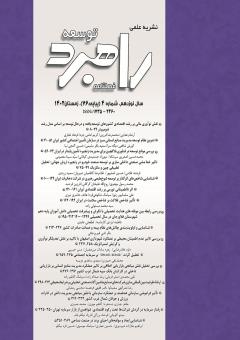ارتقاء ظرفیت بین المللی¬سازی شرکتهای صنایع ماشینآلات صنعتی: تحلیلی بر شرایط محیطی
محورهای موضوعی :رضا نصرالهی سعیدلو 1 , ناصر فقهی فرهمند 2 , مجتبی رمضانی 3
1 - دانشجوی دکتری گروه مدیریت صنعتی، دانشکده مدیریت حسابداری اقتصاد ، واحد تبریز، دانشگاه آزاد اسلامی، تبریز، ایران
2 - 0دانشيار، گروه مديريت صنعتی، واحد تبريز، دانشگاه آزاد اسلامي، تبريز، ايران(نویسنده مسئول
3 - 0استاديار، گروه مديريت بازرگاني، واحد بناب، دانشگاه آزاد اسلامي، بناب، ايران
کلید واژه: کلیدواژهها: بین المللی سازی, عوامل محیطی, صنایع ماشین آلات صنعتی, کشور میزبان. ,
چکیده مقاله :
چكيده زمینه و هدف: کسب و کارها در راستای بین المللی سازی، در محیط خارجی گسترده اي فعالیت می کنند که جنبه هاي آن باید بررسی ، تحلیل، درك و تفسیر شوند، بر این اساس، پژوهش حاضر به دنبال شناسایی شرایط محیطی بر بین المللی سازی شرکت های صنایع ماشین آلات صنعتی است. روش¬: پژوهش حاضر دارای رویکرد کیفی، در قالب پارادایم تفسیری است. در این پژوهش برای تحلیل دادههای بهدستآمده، از راهبرد تحلیل مضمون استفادهشده است. ابزار گردآوری دادهها، مصاحبههای نیمه¬ساختاریافته از نوزده نفر از خبرگان و مدیران کسبوکارها در زمینه تولید ماشینآلات در صنایع محصولات ساختمانی که بهصورت هدفمند انتخاب شدند. برای اعتبارسنجی مدل پژوهش از دو راهبرد بازبینی خارجی و تکثرگرایی استفاده شد. یافتهها¬: یافته¬های پژوهش حاضر نشان داد که بررسی عوامل محیطی در جهت بین المللی سازی شرکت ها عوامل زیر مدنظر قرار دادن عوامل زیر است: ظرفیت محیطی کشور میزبان، شناخت قوانین مالیاتی، تحلیل بازار، ارزیابی هزینه¬ها، آرامش سیاسی کشور میزبان، تعاملات بینالمللی، قوانین و مقررات کشور میزبان. نتیجه¬گیری: نتایج بهدستآمده حضور در بازارهای جهانی نیازمند شناخت محیطی است که در یک کشور خاص فعالیت میکنید، برای این امر، شرکت¬ها نیازمند توجه به شناخت محیط کشور میزبان، حمایتهای دولتی، رعایت استانداردهای بینالمللی، تحلیل بازار و چالشهای بینالمللی است.
Reza Nasralhi Saeed Lou Naser Fghhi Farahmand Mojtaba Ramezani Abstract Background and purpose: Businesses in the direction of internationalization operate in a wide external environment, the aspects of which must be analyzed, understood and interpreted, based on this, the present research seeks to identify the environmental conditions on the internationalization of companies. Industry is industrial machinery. Methodology: The current research has a qualitative approach, in the form of an interpretive paradigm. Thematic analysis strategy was used to analyze the obtained data. The data collection tool was semi-structured interviews of nineteen experts and business managers in the field of machinery manufacturing in the building products industry who were selected purposefully. To validate the research model, two strategies of external review and pluralism were used. Findings: The findings of the present research showed that the examination of environmental factors for the internationalization of companies is to consider the following factors: environmental capacity of the host country, knowledge of tax laws, market analysis, cost evaluation, political peace of the country. Host, international interactions, rules and regulations of the host country. Conclusion: The results achieved by being present in global markets require knowing the environment in which you operate in a particular country. For this, companies need to pay attention to knowing the environment of the host country, government support, compliance with international standards, market analysis and international challenges.
